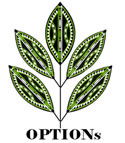Training materials for farmers and knowledge extension
A practical handbook for farmers and experts is produced, giving information on best practices on the use of pesticidal plants. The Handbook on Pesticidal Plants can be dowloaded from here and can also be found on the ICRAF online library.
Anjarwalla P, Belmain S, Sola P, Jamnadass R, Stevenson PC. 2016. Handbook on Pesticidal Plants. World Agroforestry Centre (ICRAF), Nairobi, Kenya
The National Museums of Kenya team at the East Africa Herbarium leaflet on the propagation of Securidaca longepedunculata, one of the target indigenous, slow-growing, recalcitrant species of the OPTIONs project.
Proceedings of a training workshop on Optimisation of Pesticidal plants: Technology Innovation, Outreach & Networks (OPTIONs). The workshop was held at the World Agroforestry Centre, Nairobi, Kenya, 28-30 October 2014. Presentations from this workshop on growing and using pesticidal plants are found below.
Pesticidal plants, an alternative to synthetic chemicals
Sustainable harvesting of pesticidal plants
Status and availability of germplasm of pesticidal plants
Making quality seed collections
Principles of propagation and cultivation of pesticidal plants
Using pesticidal plants for crop protection
Potential for small scale marketing of pesticidal plants
Current status of pyrethrum sector in Kenya
Overview of the organic agriculture sector in Kenya
Fact sheets have been created in collaboration with the World Agroforestry Centre and the Royal Botanic Gardens Kew. More information about these pesticidal species can be found on the Plant Database pages as well through ICRAF's species switchboard
Fact sheet about Aloe ferox
Fact sheet about Chenopodium (syn. Dysphania) ambrosioides
Fact sheet about Euphorbia tirucalli
Fact sheet about Lippia javanica
Fact sheet about Securidaca longepedunculata
Fact sheet about Solanum incanum
Fact sheet about Strychnos spinosa and in Kiswahili
Fact sheet about Tagetes minuta and in Kiswahili
Fact sheet about Tephrosia vogelii and in Kiswahili
Fact sheet about Tithonia diversifolia
Fact sheet about Vernonia amygdalina
Fact sheet about Zanthoxylum holtzianum
Seed collecting techniques by Michael Way and Kate Gold, Seed Conservation Department, Millenium Seed Bank, Royal Botanic Gardens Kew
Guidelines for the Sustainable Harvesting of Traditional Medicinal Plants - but just as relevant for harvesting pesticidal plants
Anjarwalla P., Ofori D.A., Jamnadass R., Mowo J.G. & Stevenson P.C.(2013). Proceedings of a training workshop on sustainable production, harvesting and conservation of botanical pesticides. World Agroforestry Centre (ICRAF), Nairobi, Kenya. 61pp.
Please make sure to have a look at the Plants Database page where information about how to use certain pesticidal plant species can be found
Popular press articles
A training workshop with more than 60 farmers from Western Kenya took place at the National Museums of Kenya over the 25th and 26th May. Training was provided on how to use pesticidal plants, giving farmers practical hands-on experience in making their own extracts. The event was broadcast on Kenyan national news by TV channel KBC as well as in several newspapers.
A new leaflet published by the Alliance for Food Sovereignty in Africa provides practical advice on Using Pesticidal Plants for Pest Management in Africa. And in French.
New leaflet highlighting OPTIONs activities and partners in Kenya: OPTIONs partnership encourages farmers to grow and use natural pesticidal plants, rather than synthetic chemicals for pest control
Article appearing on the ENSIA web magazine, Could traditional plants hold the secret to saving crops from pests? Researchers build on age-old practices to reduce food loss in Africa.
OPTIONs pesticidal tree planting initiative is profiled in a newsletter from Sustainable Global Gardens
An article about the OPTIONs project is published in The Ismaili Magazine: Pesticidal plants to protect crops and grains
CIFOR's Forest News highlights OPTIONs work on understanding policy issues: In fight against African pests, researchers point to natural-born killers
Grow your own pesticidal plants - a blog by ICRAF
The ACP S&T leaflet about OPTIONs

